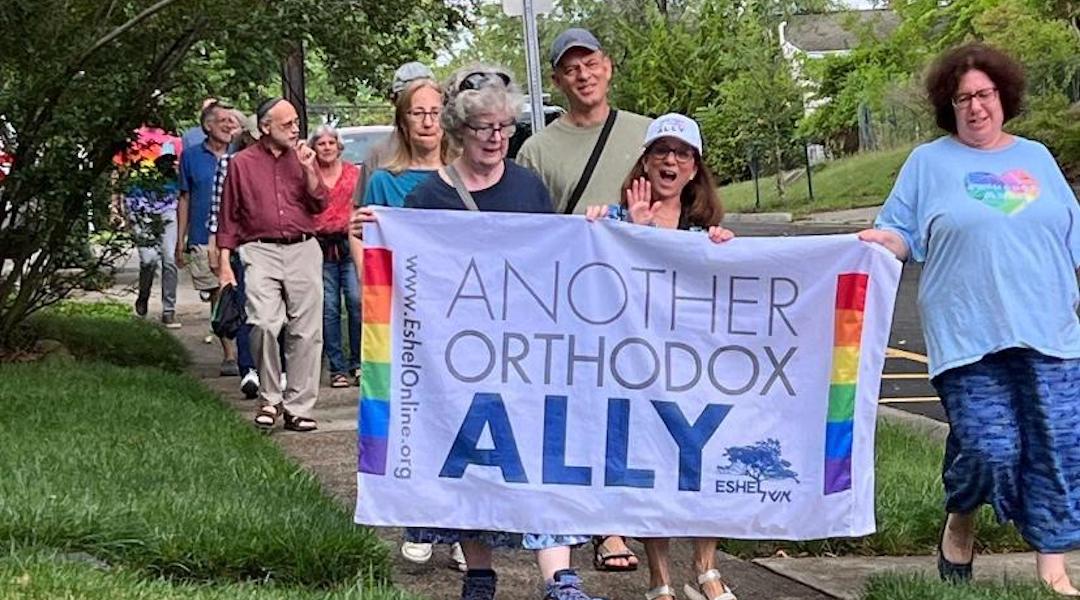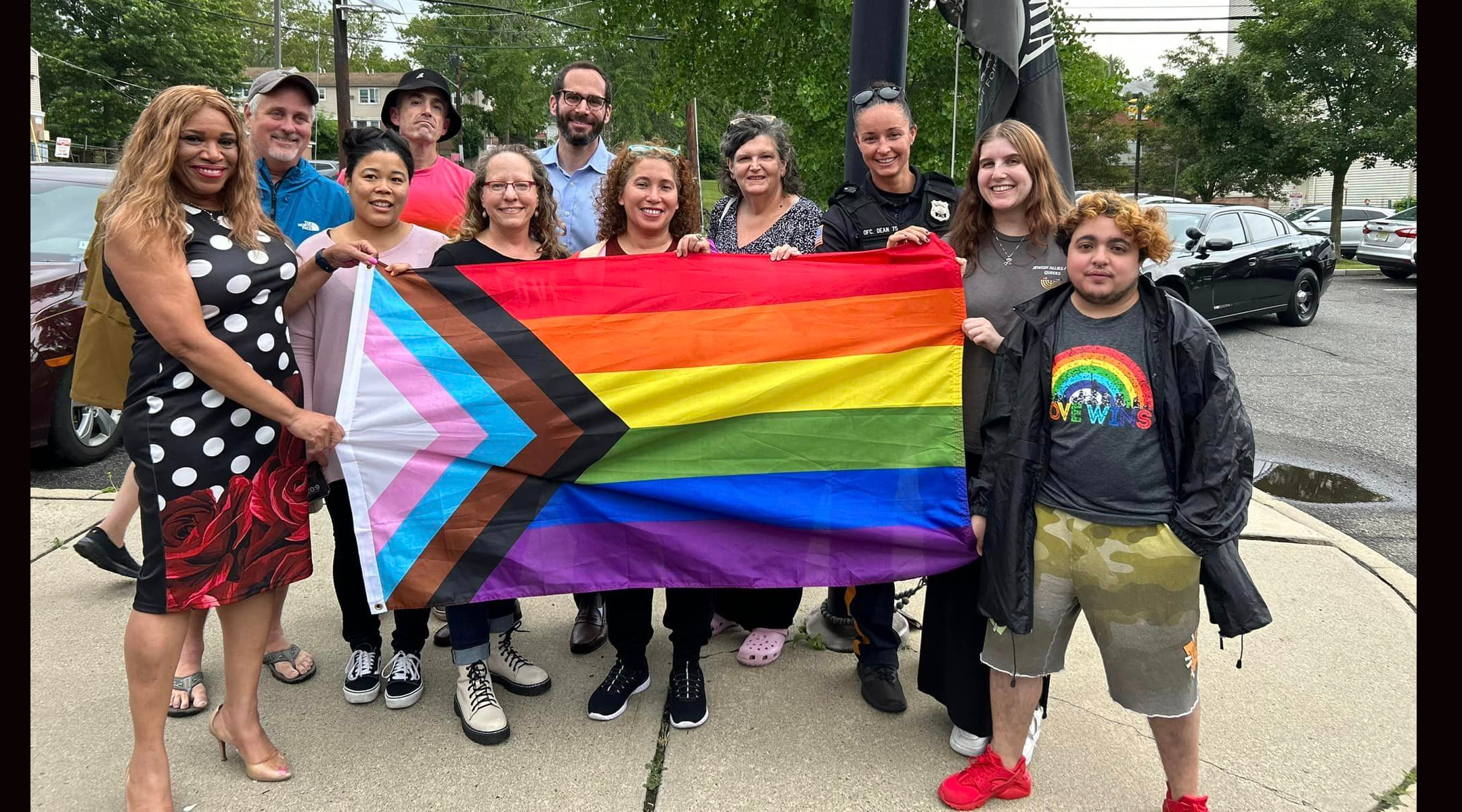A New Jersey mayor apologizes for removing Pride flags at 2 synagogues’ request
The city of Highland Park has reinstated four Pride flags two rabbis had asked the mayor to take down

Members and allies of Eshel, an advocacy group for LGBTQ Orthodox Jews and their families, march in Highland Park, New Jersey, as Pride flags are restored to a public street after they had been removed at the request of Orthodox rabbis, June 26, 2023. (Courtesy of Eshel)
(JTA) – In early June, the city of Highland Park, New Jersey, had one of its central thoroughfares decked out in rainbow Pride flags to celebrate an upcoming LGBTQ-themed music festival.
But four days after the display went up, Highland Park’s mayor took four of the flags down. According to communications from city officials, Congregation Ohav Emeth, a local Orthodox synagogue, had objected to the quartet of banners waving in front of its building. So had the rabbi of another Orthodox congregation about half a mile away.
Now the town’s mayor, Democrat Elsie Foster, has reversed her decision again following public pushback. The flags are back up, and Foster has issued a public apology for the incident.
“I learned a lot from the comments of many residents and especially the thoughtful teens who spoke at the Mayor and Council meeting,” Foster wrote in a statement posted to Facebook, referring to a meeting last week of Highland Park’s Borough Council. “I’m sorry for the miscommunication and missteps that took place earlier and I am happy to honor those who respectfully urged us to reconsider.”
The dust-up highlighted a local manifestation of what has been, at times, a broader contentious relationship between LGBTQ people and Orthodox institutions. Although some parts of the Orthodox community have become open to LGBTQ inclusion in recent years, others remain more skeptical of its place in observant Jewish spaces. The flagship Modern Orthodox campus, Yeshiva University, has cited its status as a religious institution in an ongoing legal battle over its refusal to recognize an LGBTQ student group. The recent death by suicide of a gay Orthodox alum, his friends said, highlights the strife of being Orthodox and gay.
“There is a cultural divide between the rabbis and the LGBTQ+ community,” Miryam Kabakov, executive director of the nonprofit Eshel, which supports LGBTQ Orthodox Jews and their families, told the Jewish Telegraphic Agency about the flag controversy.
“The rabbis think that LGBTQ+ symbols are about sex,” Kabakov added. “They are not. They are about not feeling shame anymore for who you are. They are about turning shame on its head, so that you can walk into shul with your head held up high, proud of everything that you are and not hiding who you are.”
Foster said her goal was to thread a line between what she saw as genuine religious concerns from one part of her community and a genuine desire for respect and inclusion from another.
“My objective is twofold: to promote the safety, security, respect, and support of the Borough’s LGBTQ+ community, while also respecting the religious sensitivities of our Orthodox Jewish community,” the mayor said in a statement to JTA. “I firmly believe that both objectives can be pursued simultaneously and I’m encouraged by the positive feedback we’ve received from numerous residents who recognize the dedicated efforts we’ve made to address these concerns.”
Ohav Emeth’s rabbi, Eliyahu Kaufman, declined a JTA request for comment, as did Rabbi Steven Miodownik, who heads Congregation Ahavas Achim, another Orthodox synagogue nearby that shares a vaad, or rabbinic council, with Kaufman’s synagogue. According to a spokesperson for the city, Miodownik had sent a private communication to the mayor requesting that the flags be removed.
Foster did not name Kaufman as the rabbi she spoke with or the synagogue that had made the request. But she said at the Borough Council meeting that the affected flags had been flying directly in front of a congregation that was located near the music festival being staged the weekend of June 9. Ohav Emeth matches that location.
“I did have a conversation, a very private conversation, with a rabbi, and a request was made,” Foster told constituents at the council meeting on June 20. Several public commenters — including a handful who identified as LGBTQ Orthodox Jews — had come to the meeting to express outrage and speak out against the flags’ removal.
“Maybe I should have taken a step back and listened and waited,” Foster acknowledged at the meeting, after adding that the rest of the 30 Pride flags the city had installed on that street for the festival had remained up. “But that did not happen. And to err is human, and I happen to be human.”

Foster’s admission that she had removed the Pride flags at a rabbi’s request contradicted an earlier apology she gave to her constituents in which she stated, “I want to assure you that our decision to remove the flags was not in response to any specific request or discriminatory motive.”
For decades, the Orthodox world has struggled with whether and how to accept LGBTQ people. Nearly all modern interpretations of Orthodox law forbid same-sex relations, though recently a number of Orthodox public figures have come out as queer. On the other side of the coin, some of the most prominent anti-LGBTQ voices on the internet, including Chaya Raichik, creator of the social media account Libs of TikTok, are also Orthodox Jews. Raichik is one of the most prominent purveyors of the slur that LGBTQ people seek to “groom” or otherwise harm children.
Surveys show that American Jews at large support LGBTQ rights. But as discussions of LGBTQ equality and visibility have taken center stage in the United States’ culture wars, even Jewish groups that advocate for LGBTQ rights have faced dilemmas about how to translate that support into action.
A local Orthodox parent of an LGBTQ child, who contacted Kabakov in distress, told JTA that as a result of the controversy, Highland Park residents had raised more than $1,200 for Jewish Queer Youth, another organization advocating for LGBTQ Jews in Orthodox spaces.
“A rabbi saying that a pride flag goes against a synagogue’s values is sending a message, intentional or not, to their congregants and beyond, some of whom look to that flag as a lifeline,” said the parent, Randi Ostrove. “It’s irresponsible and unacceptable and we must demand better.”
Some of the crowd at the June 20 Borough Council meeting in Highland Park accused the local government of bowing to religious pressure, failing to protect the separation of church and state and creating an unsafe environment for the LGBTQ community. One person who spoke linked the synagogue’s request to anti-LGBTQ behavior by the Christian right.
Others spoke up in favor of the synagogue’s request. One speaker, attorney John Kovac, characterized the pride flag as a symbol of sexual immodesty that runs contrary to Orthodox Jewish values.
“The First Amendment and basic principles of respect for others support their right to object to attempts to force on them what has at times been displayed as a symbol of immodesty,” Kovac said, adding, “Mayor Foster did exactly what she should have done when faced with a conflict between constituents in town. She listened to and empathized with both sides and did her best to accommodate the needs of each.”
Matthew Hersh, the Borough Council president, defended the flags at the meeting.
“When we talk about pride, we’re talking about something that affects not one religion, not one code of beliefs, not one ethnicity, not one cultural background,” he said. “It really is a universal understanding of acceptance and then, intentionally, it is to support and protect our friends in the LGBTQ+ community.”
While some in Highland Park portrayed the divide as one between the Orthodox Jewish and LGBTQ communities, others cautioned against viewing the two groups as completely separate. Elissa Kaplan, an LGBTQ Orthodox Jew, told the crowd at the council meeting that her dual identities made her “a potential model and bridge” for the community.
“I’ve had both of my communities pressure me at various times about giving up the other community,” Kaplan said, but insisted that each could learn something from the other. She hoped the pride flag controversy would result in “much more mutual respect for each other” and create the opportunity for the LGBTQ and Orthodox communities to become “pleasant neighbors and townspeople together.”
Eshel participated in a planned rally on Monday in support of the Pride flags’ return, which was organized by the LGBTQ music festival that took place earlier this month around the corner from the synagogue. The event “went amazingly well,” Kabakov said. Yet, she added, “We worry about the future of Orthodox LGBTQ+ people.”
Orthodox leaders, she said, “are lagging behind in fully integrating what was true all along, that LGBTQ+ people are part of their shuls whether they know it or not.”
Meanwhile, the student president of the Jewish Allies & Queers group at Rutgers University, in the neighboring city of New Brunswick, was a featured speaker at a pride flag-raising event the city had scheduled for Monday at a separate location. In a nod to the controversy, that event — which was attended by the mayor, at least one Orthodox city staffer, and other local officials — began with a march down Raritan Avenue, where the flags had been restored in front of the synagogue.
This article originally appeared on JTA.org.






















